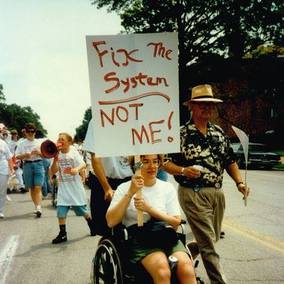
For this fear I spent half an hour every morning rehearsing fluency at 60 SPM: “wheeen the suuunliiight striikes raaindrops iiin the aaAir . . .” I was determined not to let stuttering hold me back – “I CAN ACHIEVE ANYtt-----ttTHING WITH PERSISTANCE!” Yet perhaps it would be better to say that I simply feared my mouth once again swelling shut with shame.
My speech pathologists taught me self-acceptance. Self-love. They told me it didn’t matter what other people thought of me. I should just ignore them. “They’re ignorant,” I was told. Sunday School taught me to forgive those who mocked me. Let it go—they’re not worth your time.
The one thing I was never told that was that I could get angry. Fucking angry.
Fury is a proper response to injustice and oppression, to silencing, stereotyping, and co-option. All emancipatory movements of the twentieth century—civil rights, disability rights, feminism, and queer liberation—have been fueled by anger focused into resistance. As the legendary Audre Lorde writes, “Anger is an appropriate reaction to racist attitudes, as is fury when the actions arising from those attitudes do not change.” [1] For so long, disabled people have been treated as objects of charity and welfare, expected to accept the scraps society doles out with a thankful tear in our eye. In contrast, the disability rights movement teaches us to “piss on pity” and be outraged at our exclusion and marginalization.
So where the hell is the fury in the stuttering community? We are jesters in music and film. People mock, stop, and dismiss our words. We are inspirational when we overcome our “tragedy” and lazy when we do not. We are regularly not treated as equal citizens, denied time, jobs, and respect. I should be livid when your discomfort makes me hate myself. When you tell me to sit down halfway through my class presentation. When you don’t absorb anything I’ve said because you’re too busy feeling sorry for me. When you medicalize my body and claim to be the expert on my speech. I should be outraged at everyone who helps, in a million little ways, to create and sustain a world that oppresses dysfluent speakers.
Yet for all of this the stutterer is trained (with stickers and (social) gold stars!) to be mild-mannered and submissive—to accept ourselves. Does no one find this absurd? This is domestication, not liberation! We as a community are far too easily satisfied. Oh, it’s certainly permissible if I occasionally get angry at myself, if it leads me to work harder and persevere. But direct that anger towards the world? Ruffle some feathers? Dare to make our frustration political? All of a sudden we are stuttering out of line. All of a sudden we are unruly, dangerous.
(We will not, by the way, be towed back in line through claims that we’re just playing the victim card or being lazy. In every movement, these have always been cowardly responses used to maintain the status quo.)
Here’s what anger does. It focuses us. It enlivens us. But most of all, it centers attention where it needs to be: on the injustice of the stuttering experience. My tongue is not the problem. My tongue has never been the problem. Getting angry lets me remember this.
Anger is a rallying cry. In the fight for gender equality, anger remains a driving force behind suffrage, workplace equality, and bodily autonomy. In the civil rights movement, anger fueled leaders from Martin Luther King, Jr., to Malcolm X, to Audre Lorde in rallying the multitude and making sure they will no longer be ignored. Anger continues to be a life-giving force in the face of marginalization, as, for example, recent events in Ferguson have shown.
In the disability rights movement, anger forces those who are “abnormal” and subhumanized to be confronted, at least for an instant, as persons. When those who are institutionalized without their consent, medicated against their wishes, isolated, ignored, diagnosed, stigmatized, rehabilitated, sterilized, denied education, criminalized, and left in poverty with no escape beyond the bureaucratic welfare and intermittent charity of those caregivers and systems disabled people too often find themselves utterly dependant on, anger is a lifeline in demanding that injustice be recognized and that oppressed peoples be heard on their own terms. Anger is a bastion for communities who refuse to simply smile and be grateful. Anger fuels change.
Anger can be this for stutterers.
It’s time to take back our speech.
-Josh
[1] “The Uses of Anger: Women Responding to Racism”
 RSS Feed
RSS Feed
